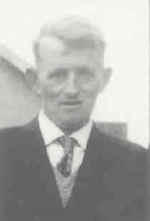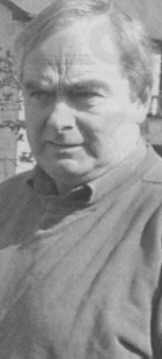The Barron Inquiry - Draft Terms of Reference for Inquiry - A Fresh Inquest - 2005 Inquest Account - BIRW Report - Witness Account - Ludlow Family Account - Sunday World report May 1976 - Meeting the Police Ombudsman - Ed Moloney Radio Interview - 25th Anniversary - Profile - Questions - Photographs - Press Release - Letter to RUC - Magill article 1999 - Press Coverage - Barron Report Published - Ludlow Family Response to Barron Report - Download the Barron Report from the Oireachtas website (pdf file) - Statement from Justice for the Forgotten - Joint Oireachtas Committee Request for Submissions - Joint statement from Justice for the Forgotten, Relatives for Justice and the Pat Finucane Centre - Download Transcript of Ludlow family meeting with Oireachtas Sub-Committee (Word file) - Publication of the Oireachtas Report - Download the Final Oireachtas Sub-Committee Report on the murder of Seamus Ludlow from the Oireachtas website (pdf file) - Ludlow family press release in response to the Oireachtas Report
Original Ludlow Family website - Second Ludlow Family website - The Dundalk Bombing
The Argus (Dundalk), 5 April 2006:
Final report of the Independent Commission of Inquiry into the murder of Seamus Ludlow
Credit given to the family for their continued search for justice over 30 years
 The
struggle of the Ludlow family to discover the events surrounding the
murder of their brother and uncle and the reasons behind the failure to
bring his killers to justice is acknowledged in the Final Report by the
Oireachtas Joint Committee.
The
struggle of the Ludlow family to discover the events surrounding the
murder of their brother and uncle and the reasons behind the failure to
bring his killers to justice is acknowledged in the Final Report by the
Oireachtas Joint Committee.
The chairman of the Joint Committee, Deputy Sean Ardagh, says that they were "particularly touched by intense trauma and feelings of abandonment experienced by the relatives. In particular, credit is due to the Ludlow-Sharkey family for their continued search for justice over 30 years."
The committee hoped that "the process of holding these hearings as part of the consideration of the Report by the Independent Commission of Inquiry goes some way towards assisting the relatives in dealing with their ongoing grief and suffering."
 The
report details how "Seamus Ludlow was a quiet unassuming man whose
life revolved around family and home. He occasionally visited pubs in
Dundalk and he was known for his charitable work. There was nothing
whatsoever to connect him with any subversive organisations and members
of his family recalled that he was firmly opposed to the IRA and similar
groups."
The
report details how "Seamus Ludlow was a quiet unassuming man whose
life revolved around family and home. He occasionally visited pubs in
Dundalk and he was known for his charitable work. There was nothing
whatsoever to connect him with any subversive organisations and members
of his family recalled that he was firmly opposed to the IRA and similar
groups."
His sister Nan described him as being "a very good fellow. He was a very good living chap. He never gave any trouble to anyone. He was very kind to my children. He was a good living man too so there is no one to say anything about him."
She told how the family had never told their mother about his murder.
"We had to tell her he was in a car accident. We could not tell her the way he was shot. She died not knowing. She never knew about it. You could not tell her; she was confined to bed. She was heartbroken."
The manner in which Seamus' murder was investigated by Gardai brought further trauma to the family.
 Mrs
Eileen Fox, a sister of Seamus Ludlow, was critical of the way in which
the Gardai handled the investigation and the suggestion by them that he
had been killed by the IRA.
Mrs
Eileen Fox, a sister of Seamus Ludlow, was critical of the way in which
the Gardai handled the investigation and the suggestion by them that he
had been killed by the IRA.
"We were subjected to an awful lot of harassment from Gardai who were in and out every day. For weeks they were with me in the house every day. They were saying it was the IRA and this and that.
Mr Michael Donegan, a nephew of Seamus, explained that his father, Kevin Donegan (who had been in the Irish Defence Forces for 14 years), had believed the suggestion by the Gardai that the killing of his brother(-in-law) was arranged by the IRA and carried out by members of the Ludlow family because Seamus was an IRA informer. This had given rise to tension within the family.
"There is no question about it," he told the hearing. "The killing traumatised the family, turned us upside down. To a large extent it put our lives on hold for the next 30 years, which is why we are here today."
He said his father "had met these gardai over a number of months and they just kept putting it home to him: the IRA, the IRA, the IRA. He went to his grave with that belief: that it was he IRA, because of what they told him. There is no question that it caused a lot of conflict in my house. I am not going to try and avoid it now."
Mr Jimmy Sharkey, a nephew of Seamus, told the Sub-Committee, "In general, the Garda Siochana's behaviour towards us over 30 years has been nothing short of terrible. It has been a terrible experience for us all and even harder for Kevin Ludlow, Eileen Fox and Nan Sharkey. It is also hard for the rest of us at times. I was not surprised that the Garda dd that or that the State acted as it did. They have done so in similar cases, including the Monaghan and Dublin cases and, as we will see, that of Dundalk. They simply did not care. The only way that one will ever get answers is through an independent inquiry - it must be an inquiry."
One concern expressed by the family was why the suggestion had gone around at the time of the murder that Seamus might have been connected to the IRA. Mr Kevin Ludlow complained that the Gardai had done nothing to correct this false impression. He stated: "They said he was an IRA informant and that is why the IRA killed him, which was wrong. These were the lies they were giving out about the man. Seamus worked for another party at elections in Ravensdale and he definitely had nothing to do with the IRA. The IRA had no call to kill him anyway - definitely not. This is the way it was doing these things, just to blacken the family.
Mrs Nan Sharkey stated that: "We all had to listen to the rumours. What else could we have done? A lot was said that was not correct." Mrs Eileen Fox stated that she thought it was just intimidation by the Garda. "Even the day after they were still at the same story."
Deputy McGrath asked Mrs Fox if the Gardai had ever mentioned the scenario of loyalist paramilitaries or members of the UDA being involved in the murder and she said "never".
Michael Donegan stated that: "We have lived continually in the south Armagh area for all those years. I do not think there is anyone in the area who really believes that uncle Seamus was an informer, even though these rumours were out there. The rumours never went away. It would be wrong to assume that the rumours just came from the gardai - they did not. I have with me copies of two books - two scurrilous publications - written about the SAS both of which state as fact that uncle Seamus was an informer who was murdered by the IRA. I presume that the source of that information is the British Army. Clearly, the rumour mill was North and South."
Mr Brendan Ludlow stated that: "Basically speaking, the Garda told my father nothing. They treated my aunts and uncles with the utmost disrespect."
 Mr
Jimmy Sharkey told how he was questioned by Gardai.
Mr
Jimmy Sharkey told how he was questioned by Gardai.
"I, too, was twice questioned in the back of a car by Special Branch officers. On the first occasion, they took a softly softly approach, as they tried to get to know what I knew and things like that. The second time, they took a more hardline approach when they asked me who I thought killed Seamus. They kept saying that it was the IRA. When I mentioned to them that I thought the SAS or a loyalist group killed him, one particular garda got very agitated about that. He kept pointing and gesturing to me in the back seat saying things like, "You know f-ing well who killed Seamus Ludlow. You tell us it was the IRA"."
He said he hadn't let the questioning upset him. "I knew what was happening in the north of Ireland at that time, with loyalist groups, the IRA and the SAS operating along the Border. However, that was the line of questioning from the gardai. They did not want to hear anything about loyalist groups or the SAS; all they wanted to hear about was the IRA."
He described further meetings with a member of the Gardai in 1978, who when he asked him who had killed Seamus, simply abused him.
 Mr
Ed Moloney, a journalist who published articles on the death of Seamus
Ludlow, was of the view that the Seamus Ludlow affair was a
"scandal".
Mr
Ed Moloney, a journalist who published articles on the death of Seamus
Ludlow, was of the view that the Seamus Ludlow affair was a
"scandal".
"The Garda would have known almost immediately that all the customary hallmarks surrounding the shooting of an informer by the IRA were missing in Seamus Ludlow's case. Normally, informers would be taken away for lengthy interrogation to extract a confession, often over days, and then shot, whereas the Garda knew Seamus Ludlow had been alive and drinking in a bar the night before. The IRA has rules and regulations governing the treatment and proceedings against suspected informers and however one regards the IRA, they themselves take these matters very seriously.
I Top I
Download the Barron Report on the murder of Seamus Ludlow from the Oireachtas website (pdf file)
SUPPORT THE SEAMUS LUDLOW APPEAL FUND
Bank of Ireland 78 Clanbrassil Street Dundalk County Louth IrelandAccount No. 70037984
Thank You.
Copyright © 2006 the Ludlow family. All rights reserved.
Revised: April 22, 2006